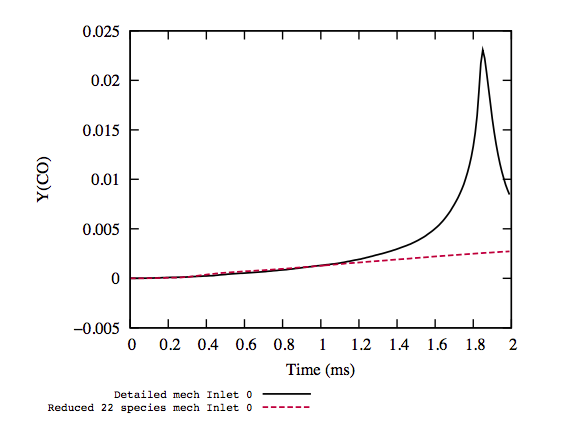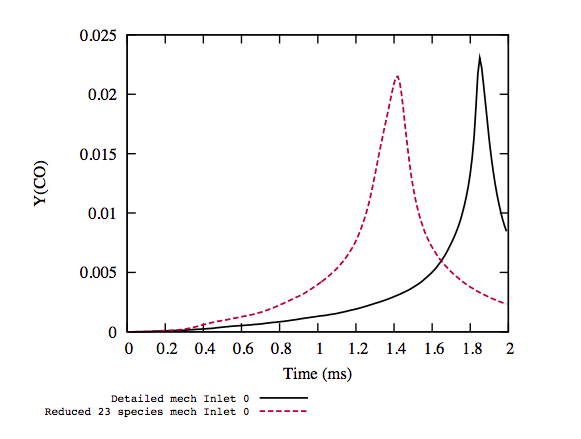Multi-inlet kerosene/air flame with scheme
Objectives
The Stochastic_ReducedLuche test case shows the reduction of a reduced version of the Luche scheme [1], for a 0D 2-inlet configuration. Started with 43 species and 302 reactions, we reduce to 23 species and -- reactions.
Principle
The configuration has 2 inlets, one of air and the second one of pure n-decane. The Luche scheme represents the fuel with a composition mainly based on n-decane (~77%) and we choose to start from a 100% n-decane fuel here, in order to run a relatively quick test case. The target species here are , and .
Key parameters
The main parameters are found in the condition.cpp file.
configuration = "MultipleInlet"; step = "DRGEP_species";
When you perform the next steps, the given mech is the one chosen from the previously step.
mech= "mechanisms/luche_red_43s.xml"; mech_desc = "luche";
//Inlet 1
listInlets.push_back(new MultipleInlet(
/*Temperature*/ 750,
/*Pressure*/ 1E+05,
/*Mass flow rate*/ 0.500,
/*Xk*/ "O2:0.2321, N2:0.7679",
/*Yk*/ "",
/**/ false,
/**/ 0.0,
/**/ 0.0,
/**/ 0.0,
/**/ 0.0));
//Inlet 2
listInlets.push_back(new MultipleInlet(
/*Temperature*/ 750,
/*Pressure*/ 1E+05,
/*Mass flow rate*/ 0.017,
/*Xk*/ "NC10H22:1.0",
/*Yk*/ "",
/**/ true,
/**/ 1.28E-05,
/**/ 4.91E-4,
/**/ 810,
/**/ 251000));
A third inlet is set for the burned gases, with the composition calculated at equilibrium.
//BurnedGases
listInlets.push_back(new Characteristics_MultipleInlet(
/*Temperature*/ 2000,
/*Pressure*/ 1E+05,
/*Mass flow rate*/ 0.200,
/*Xk*/ "N2:0.76308, O2:0.093573, H2O:0.072355, CO2:0.070468",
/*Yk*/ "",
/**/ false,
/**/ 0.0,
/**/ 0.0,
/**/ 0.0,
/**/ 0.0,
/*tau_t*/ 2e-04,
/*delta_t*/ 1e-05,
/*nbIterations*/ 200,
/*BurnedGases*/ true));
Be careful, the new_mixing parameter must be set to true only for the first step (DRGEP_species in that case).
new_mixing = true;
Results
DRGEP step
The DRGEP_Species step ranks the species as follows
0 NC4H3 1.12055e-05 C3H2 1.57332e-05 C3H3 0.00137745 C2H 0.00594322 C2H2OH 0.00886416 AC3H5 0.0125369 C2H2 0.0137016 CH2OH 0.0255753 PC4H9 0.0262539 CC10H21 0.0264408 DC10H21 0.0306194 HCCO 0.0318286 CH2HCO 0.0352984 CH2CO 0.0563039 C2H3 0.0568945 C2H6 0.0712826 H2 0.0905014 CH4 0.091268 EC10H21 0.0939194 AC10H21 0.0998347 AC5H11 0.108332 CH2O 0.133531 HCO 0.163655 CH3O 0.19981 AC8H17 0.207181 C2H5 0.241639 AC7H15 0.307516 CH3 0.30758 C2H4 0.416049 O 0.460056 OH 0.874397 H 0.911652 AC6H13 0.91635 BC6H13 0.999616 NC3H7 0.999616 C3H6 0.999907 HO2 1 O2 1 CO 1 CO2 1 NC10H22 1 H2O 1 N2
If we keep 23 species, the trajectories of the targeted species have the same shape as the reference ones but are offset, whereas with 22 species we don't have the good tendencies at all. See for example the CO trajectory with 22 and 23 species :
After choosing the 23 species 93 reactions scheme, we now rank the contribution of all reactions on the targeted species with the DRGEP_reactions step
step = "DRGEP_reactions"; mech = "mechanisms/drgepSpecies23.xml";
new_mixing = false;
Bibliography
- ↑ J. Luche. Elaboration of reduced kinetic models of combustion. Application to a kerosene mechanism. PhD thesis, LCSR Orleans, 2003.

